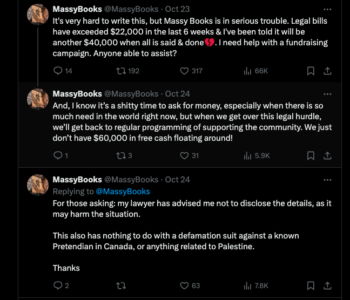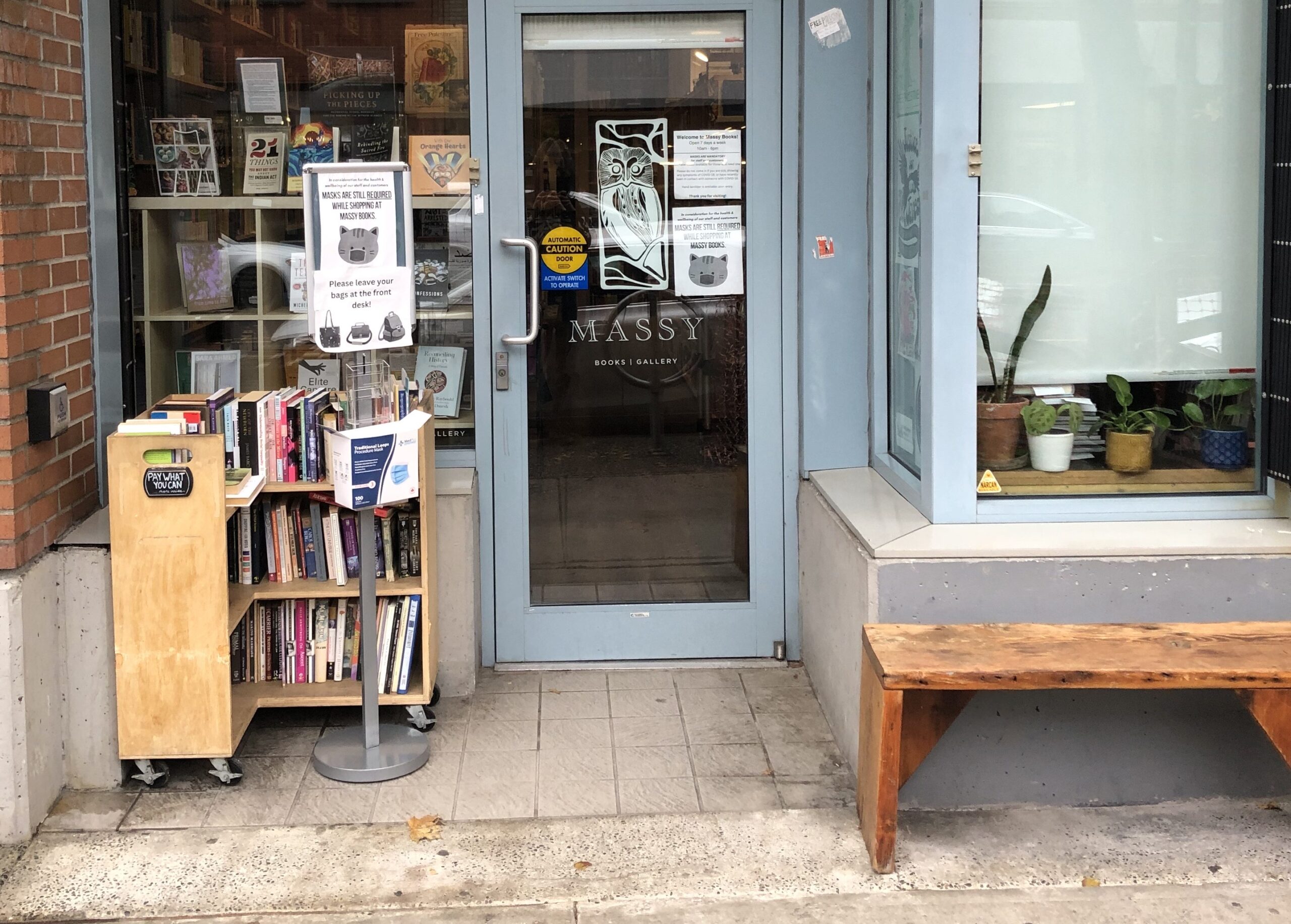On Sept. 11, a near-unanimous majority of workers at Massy Books and Massy Arts Society voted to join the Arts and Cultural Workers’ Union, IATSE Local B778. The Massy Union was approved for certification by the BC Labour Relations Board on September 16, according to the Board’s official website.
The Vancouver-based Arts and Cultural Workers Union (ACWU) was formed in 2020 to organize workers in the arts and culture sector. Shortly after its formation, the ACWU joined the larger International Alliance of Theatrical Stage Employees (IATSE).
Twelve employees of Massy Books and Massy Arts Society voted to join the union, according to a Massy union member. The union drive took place largely in August. Two of the now-unionized workers are Indigenous, according to three members of Massy Union who spoke with The Mainlander.
All Massy workers who were interviewed by The Mainlander have asked to remain anonymous to avoid requital in the workplace.
Since its founding in 2017, Massy Books has been a local beacon of many anti-colonial and Indigenous sovereignty movements, most recently taking a firm stance against the ongoing genocide in Gaza. Founder and owner of Massy Books, Patricia Massy, is an Indigenous woman of Nêhiyaw-Métis and English descent and a member of the As'in'î'wa'chî Ni'yaw Nation, according to the Massy Arts website.
Massy Books and arts society have attracted a number of staff who are Black, Indigenous, and racialized, and the principles of Indigenous sovereignty have been central to the public messaging of the newly formed ACWU/Massy Union.
The unionization first became public in late October, when the workers sent out a press statement (shared in part here) and started an Instagram account. Posts from the @MassyBooks account on X (previously Twitter) have indicated instability and potential conflict at the company for several months. The account, which is known to be operated by Patricia Massy, has been set to private in recent days and remains so at the time of publication.
Massy founder and owner Patricia Massy declined The Mainlander’s request for an interview, citing alleged misinformation retweeted on The Mainlander’s X account.
Why Unionize?
Massy workers cite decolonization, community, and accountability among their reasons for unionizing in their public statements and in interviews with The Mainlander.
In an Oct. 24 press statement, they state that their aim is “to establish a healthy and safe environment for all current and future staff members, rooted in true equity and accountability,” and that “[u]nionization represents a critical step toward creating a fair and equitable workplace, while also supporting broader social justice initiatives, including Indigenous sovereignty.”
Massy Union’s public communications have also focused on demands for improved working conditions, scheduling, job security, and labour rights rather than wages.
The Oct. 24 statement cites shared grievances among workers, reading in part: “The workers say they have faced extensive documented and undocumented mistreatment from the owner and executive director Patricia Massy leading to cut hours and resignations, many of whom are Black, Indigenous, people of colour, and queer.”
Unionizing creates an avenue to bring grievances collectively instead of engaging in individual interactions with the employer, multiple workers stated in interviews.
Workers allege that the employer has created individual hardship and sometimes an unpredictable favouritism, which has led to cut shifts and employee turnover.
In an email, one Massy worker said that these practices have included “removing most or all of a staff member’s regular shifts from the schedule without any formal notice of dismissal, for cause or otherwise. Usually, staff quit or quietly find other work.”
Another Massy worker wrote that “We chose to unionize rather than utilize the conflict resolution procedures [offered by Patricia Massy], because the conflict resolution procedures have been ever-shifting and created solely by the employer, often during times of conflict with staff. These did not feel like safe options for staff.”
“We seek to reduce staff turnover, while supporting their well-being and safety in ways that do not feel threatening to their job security/emotional safety in the workplace from the employer.”
Union Busting?
Since the formation of Massy Union, Massy workers have documented actions on the part of the employer they classify as “union busting.”
“The employer’s actions, including sending a letter to staff urging them not to unionize, resisting our application to allow the bookstore and gallery employees to bargain together for a common collective agreement, and soliciting donations on X for unspecified legal fees, reflect a refusal to engage in constructive dialogue, despite our hope for collaboration to improve workplace conditions,” reports Massy Union in an October statement.
On Sept. 12, Patricia Massy issued a memo to Massy staff carrying the subject line “re: unionizing.”
The memo, which was shared with The Mainlander, states “I understand why some staff would like to unionize and what they hope unionization might offer them. However, it is my opinion that we do not need to unionize, and I personally would not like it to occur.”
The memo goes on to detail increases in the cost of wages, benefits, property taxes, and business operations as contributing to an unstable financial situation. Massy also posits that unionizing will inhibit “flexibility.” “I have taken a flexible approach to scheduling, and my opinion is that unionizing might limit our ability to schedule time flexibly,” the memo states.
Despite the memo, workers proceeded with voting to unionize on Sept. 16, applying for approval of a common employer application at the BC Labour Relations Board (LRB). According to a member of Massy Union, this application would allow Massy Books and art gallery workers to bargain with their employer under one bargaining unit.
Patricia Massy retained a lawyer as early as Sept. 16 “not only to oppose joint certification of the gallery and bookstore, but also to represent her throughout the certification process, and possibly during upcoming negotiations,” one Massy worker told The Mainlander.
The lawyer in question, Eric Ito of Cooperwilliams Truman & Ito LLP, has already appeared on behalf of Massy at the LRB to lodge his client’s opposition to certification – certification that would have been automatic had all parties agreed. Given Patricia Massy’s alleged opposition, the LRB has asked each party to instead prepare evidence for a future hearing on why the common-employer application should or should not be granted – or to negotiate common ground.
Despite the employer’s demonstrated opposition to certification through September, which the workers qualify as a form of “union busting,” MU members say there are indications that Massy may cede to a compromise measure.
“This has not been finalized, it is just a verbal commitment at this time,” says one worker. Patricia Massy has recently stated in a post on X from Oct. 27, “The union would be good for me too,” suggesting a shift from the stance taken in her Sept. 12 memo to staff.
In an interview with The Mainlander, a BC-based labour lawyer echoed the potential importance of unions for workers and employers alike in situations like this: “While taking away some psychological sense of personal ownership from individual owners, unions can benefit owners in a key respect. Rather than maintaining a managerial relationship with each employee – especially when there is a dispute – unions give owners a streamlined process that can mitigate conflict and look towards the long-term.” The lawyer also wished to remain anonymous for privacy reasons.
Fundraising
In late October, Patricia Massy posted a now-deleted appeal for unspecified legal fees. The fees could potentially approach upwards of $60,000, according to one of her posts, though Massy would not specify particulars, citing advice from her lawyer. In the same thread, Massy appeared to welcome an offer of in-kind donations from at least one supporter who offered “20-30 hours every week free fundraising work.”

In an interview with The Mainlander on Oct. 26, a Massy worker stated that the request could be related to the lawyer retained by Patricia Massy to combat unionization: “What we know is that a couple weeks ago, Massy told our lawyer and union rep that she has so far spent at least $20,000 on legal fees.”
It was Patricia Massy’s call for unspecified financial support that led workers to publicize their unionization in late October, which until then had not been announced, according to one Massy worker. “We were very uncomfortable with how dishonest and untransparent that tweet was so we felt the need to act,” said the same union member.
Following numerous questions about the intended use of funds from user profiles on X, Patricia Massy tweeted on Oct. 26 that the intended purpose of donations raised was being skewed by critics and that the request had “100% nothing to do with union busting.” She shared another since-deleted post on the same day, which included a redacted bank statement and a note about high rent at Massy’s brick-and-mortar locations. X users might understandably have interpreted this post to mean that the funds raised would be used to pay rent, not legal fees as originally stated.

“Our employer stated on X that her lawyer told her not to disclose why she is fundraising, yet now claims it’s about rent after people started asking if it’s about union busting,” one Massy worker tells The Mainlander. “These inconsistencies prompt many questions. For example, why is your lawyer advising you not to talk about your need to fundraise for rent?”
Most recently, Patricia Massy has stated that no fundraising took place. In an X post on Oct. 29 she wrote, “[t]here is no fundraiser, there is no money…” The original post was technically not a call for donations, she stated in multiple subsequent posts after Massy Union went public, but only a hypothetical call for future support.
Moving Forward at Massy
Much of the workers’ fight ahead may hinge on the financial position of Massy and its owner. Regarding wages, workers have said that their first demand in negotiations will be financial transparency, and have indicated that this transparency would allow Massy Union to avoid pushing wage demands beyond the company’s capacity.
One Massy worker clarified this principle via email: “Our goal is absolutely preserving the viability of both the bookstore and art gallery, and wage demands will likely focus on enshrining in our contract the living wage commitment Massy Books has already made as a certified living wage employer through Living Wage for Families BC.”
“Our aim is not to extract unsustainable wages that would harm the bookstore or gallery,” the worker added. “To be clear, our unionization effort was not in any way motivated by our wages.”
After recently facing questions about the unspecified call for legal funds on social media, Patricia Massy is highlighting financial challenges in the areas of rent and overhead, through the MassyBooks X account – an approach that at least one Massy worker calls into question. “It seems disingenuous for Massy to solicit unspecified legal funds, then change track and say the problem is about rent… Perhaps paying the rent would be more feasible were she not retaining a lawyer to challenge unionization. [Massy] has not been transparent to us or the public about the legal case. When we go into bargaining, one of our demands will be financial transparency.”
The publicly posted bank statement indicating financial shortfalls has also been called into question by the workers, who state that they are aware of other bank accounts used in Massy’s operations. One worker commented to The Mainlander, “The single bank statement feels like an attempt to fudge a story that the business is struggling financially so she has to close the store and it’s our fault because we unionized.”
“Massy Books has worked hard to be an ally to the community and to act on the principles it stands for. Unfortunately, what people see publicly is not a reflection of what we experience in the workplace. A union would be good for everyone – but our employer is acting like we’re villains for seeking basic workplace protections,” says one Massy worker.
Another worker adds, “It’s worth remembering that it is the workers that make a space what it is. We not only curate and connect people to books, we build caring relationships with our peers and community – all of that requires our labour and our care for the place we work.”
On its Instagram account, Massy Union has asked that the public continue to shop at Massy Books and attend events at Massy Arts.















